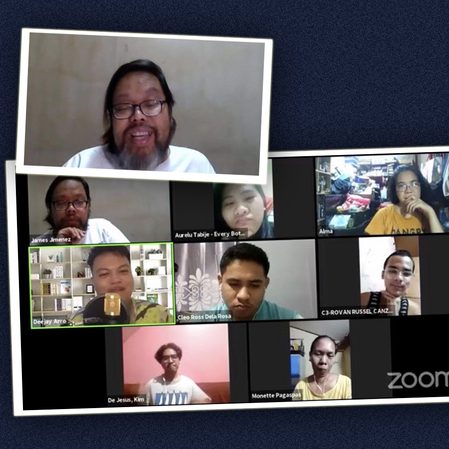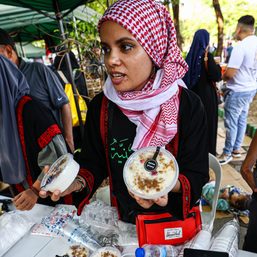SUMMARY
This is AI generated summarization, which may have errors. For context, always refer to the full article.
![[OPINION] Discerning a candidate: A spiritual and moral practice](https://www.rappler.com/tachyon/2022/02/discernment-elections-february-9-2022.jpg)
With the elections coming up, presidential candidates are now presenting their platforms, debating with one another, and campaigning throughout the country. Social media is filled with posts asking everyone to “vote wisely!” or telling in a more cynical tone, “They’re all the same and corrupt, so just vote for any of them!” There are so many options to choose from and many different platforms that don’t really seem to perfectly fit what we want. However, one thing is true: your vote will have an effect on what the next six years of our country will look like.
So how do we vote well? Whether it’s your first time voting or your tenth, we invite you to think more intentionally about how you vote this year. We often talk about voting well, and voting well requires some form of prudent judgment that is sharpened and clarified through a process called discernment.
The practice of discernment
Discernment is a spiritual and moral practice that is done in many religions and cultures. As a spiritual practice, it helps a person pay attention to the influences inside (e.g. feelings, motivations, biases) and outside (societal standards, peer pressure, information available) that affect them in making a decision. As a moral practice, it helps a person decide upon the good that they ought to do according to their conscience and their vision of how life is supposed to be – a process of intentional and gradual reflection on weighing different factors before coming to a decision.
Ignatian discernment is one of the many examples of discernment, and one we want to introduce to you, given its openness and accessibility even to those who aren’t Christian. Born from his own spiritual experiences and building upon the long Christian tradition of discerning the will of God in the world, Ignatius of Loyola, founder of the Jesuits, sees the person as someone facing a decision, and his book The Spiritual Exercises as helping that person execute that decision. Theologian Edward Hahnenberg puts it concisely, “At the heart of these meditations is a fundamental, lifelong choice in which the retreatant responds to the call of Christ by committing to a concrete course of action” with a clear mind and the right intentions.
Even though Ignatian discernment is often characterized as an individual practice – ultimately, it’s us making the decisions after all – discernment is not done alone. It is personal, yes, but not private. Ignatian discernment emphasizes the important role of a spiritual director, who raises questions to prod the person to reflect more deeply on the decisions they are making, helping the person move towards what best helps well-being, rather than away from it.
Communal discernment widens the practice of discernment not just as individuals but together as a community – whether it be a small after-school club, a local government unit, or even a national institution. Communal discernment goes beyond individual well-being and asks us to reflect together on where the community – in this case, our country – is moving towards: are we moving more towards everyone’s well-being and not just for the few, or are we moving instead in the opposite direction, towards polarization and ill-being?
Discerning the common good among different goods
The elections are a practice of communal discernment – a people discerning what the common good is and how we can achieve it together. When we speak of the common good, we aren’t just talking about aggregating individual goods, but rather we are acknowledging how different individual goods are bound up together – what will help one person flourish is also connected to the well-being of others. One’s individual good is part of the common good, and the individual’s needs are not ignored for the sake of the common good.
Key to attaining the common good is justice. The theologian David Hollenbach describes justice not just as receiving one’s due, but as participation where different stakeholders all have the opportunity to be part of decision-making, especially those communities who will be affected the most by the decisions. He says that “justice calls for the minimal level of solidarity required to enable all of society’s members to live with basic dignity.” Participation in social life, such as through voting, enables people to protect human rights and basic needs in solidarity with each other.
Genuine egalitarian participation and justice are primary principles in the way Ignatian discernment is practiced. Discerning the common good, then, is a main task in discerning who to vote for in the coming elections – which candidate/platform will best protect the human dignity of all, especially those who will be affected the most by government policies? The common good, then, becomes a main criterion for our discernment – we vote not only for ourselves but in solidarity with each other. – Rappler.com
Stephanie Ann Puen, PhD is a theologian and ethicist at the Ateneo de Manila University. She has taught and done research on economics and business ethics, Catholic social thought, sexual ethics, and theology and popular research at both the Ateneo de Manila University and Fordham University in New York. Follow her on Twitter @profspuen.
Raphael Yabut is a graduate student of theology and education at Boston College, USA. He has taught undergraduate theology at the Ateneo de Manila University. Follow him on Twitter @yabsyabuts.
Add a comment
How does this make you feel?
![[OPINION] The May elections are near](https://www.rappler.com/tachyon/2022/01/tl-may-2022-elections.jpeg?fit=449%2C449)

![[WATCH] In The Public Square with John Nery: Preloaded elections?](https://www.rappler.com/tachyon/2023/04/In-the-Public-Square-LS-SQ.jpg?resize=257%2C257&crop=414px%2C0px%2C1080px%2C1080px)
![[Newspoint] 19 million reasons](https://www.rappler.com/tachyon/2022/12/Newspoint-19-million-reasons-December-31-2022.jpg?resize=257%2C257&crop=181px%2C0px%2C900px%2C900px)

![[OPINION] The long revolution: Voices from the ground](https://www.rappler.com/tachyon/2022/06/Long-revolution-June-30-2022.jpg?resize=257%2C257&crop=239px%2C0px%2C720px%2C720px)
![[OPINION] I was called a ‘terrorist supporter’ while observing the Philippine elections](https://www.rappler.com/tachyon/2022/06/RT-poster-blurred.jpeg?resize=257%2C257&crop_strategy=attention)
![[OPINION] Stop getting owned by Apollo Quiboloy](https://www.rappler.com/tachyon/2024/04/tl-stop-getting-owned-by-quiboloy.jpg?resize=257%2C257&crop=271px%2C0px%2C719px%2C720px)
![[OPINION] On divorce and Filipino values](https://www.rappler.com/tachyon/2024/04/divorce-filipino-values-april-24-2024.jpg?resize=257%2C257&crop_strategy=attention)

![[Judgment Call] Is Rappler an ‘enabler’ of Catholic ‘copycats’?](https://www.rappler.com/tachyon/2024/04/catholics-copycats-april-18-2024.jpg?resize=257%2C257&crop=418px%2C0px%2C1080px%2C1080px)

There are no comments yet. Add your comment to start the conversation.